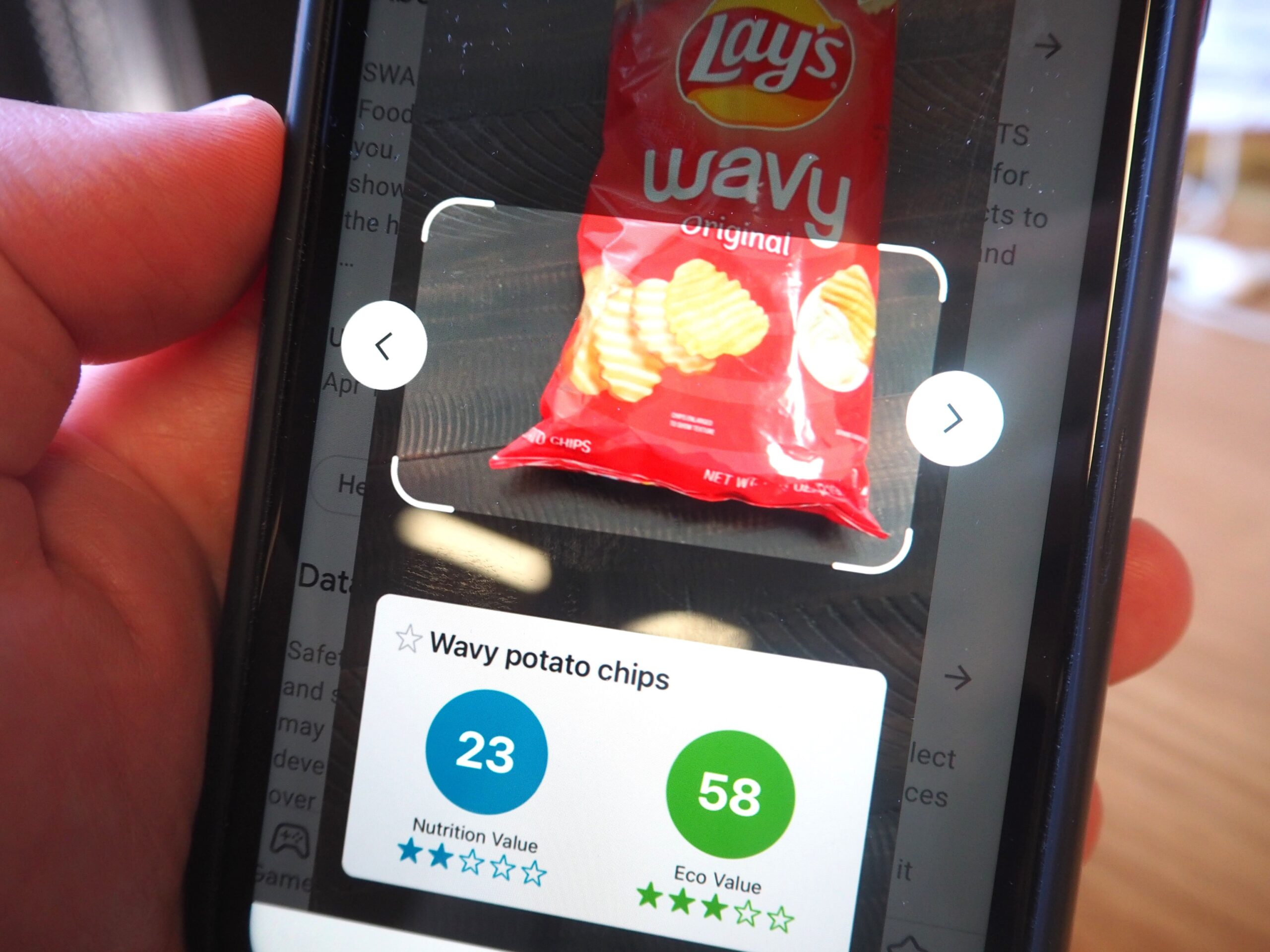
The Plateful app allows users to scan 1 million foods, then assigns those foods both a nutritional value and an “eco value.” (Justin Wingerter/BusinessDen)
The company behind a phone app for determining a food’s nutritional value has amassed $32 million in debt and still owes back pay to two dozen ex-employees as it shuts down.
Opsis Health, of Highlands Ranch, filed for Chapter 7 bankruptcy March 15, less than one year after it launched Plateful, the company’s signature phone app. Chapter 7 requires a company to liquidate its assets and distribute them among those it owes money to.
Plateful allows users to scan 1 million foods, then assigns those foods both a nutritional value and an “eco value” for determining their environmental impact, according to Opsis.
“We were unable to secure additional funding,” Opsis CEO Kevin Grundy said in a text message Monday. “I can’t comment on anything else while the bankruptcy proceedings continue.”
Kevin Johnson, a Boulder man who was Opsis’ vice president of machine learning, wrote in a November lawsuit that Opsis thought Plateful “would revolutionize diet planning and nutrition tracking.” But days before it released the app last April, Opsis’ chief operating officer “announced via a pre-recorded video that Opsis would be unable to timely pay salaries.”
During an all-hands meeting the next day, April 13, “Opsis leadership induced Opsis employees to continue working with false promises that the company would secure funding right away and pay employees,” according to Johnson’s lawsuit, which seeks $42,500 in back pay.
Edward Wiley, the former chief technology officer at Opsis, wrote in a separate November lawsuit that Opsis “continually experienced cash flow challenges, which it attempted to address through third-party financing and loans from employees,” including Wiley.
“As a result of Opsis’ cash-flow issues it, on multiple occasions, chose to withhold earned compensation from its employees,” according to Wiley, who is owed $54,000.
Johnson’s case is scheduled for trial in July. Wiley’s is scheduled for trial in September.
Opsis also owes $17.9 million to the founder of CardWorks, a subprime lender in New York, and $2.3 million to the CEO of Barry’s Tickets, an online reseller, according to bankruptcy filings.
Twenty-five other people, companies and trusts are owed a total of $6.2 million that they loaned to Opsis, primarily in the form of simple agreements for future equity, or SAFEs, an investment strategy popular with tech startups that doesn’t require selling a stake in the company.
Twenty-four former Opsis employees are owed $372,000 in back pay, the company’s bankruptcy paperwork says. Opsis also owes three law firms a total of $100,000.
In total, Opsis has $31.8 million in debt and $1.2 million in assets. Its assets are patents and computer code for the Plateful app, according to Opsis’ bankruptcy paperwork.
Its bankruptcy lawyer is Jonathan Dickey with Kutner Brinen Dickey Riley in Denver.

The Plateful app allows users to scan 1 million foods, then assigns those foods both a nutritional value and an “eco value.” (Justin Wingerter/BusinessDen)
The company behind a phone app for determining a food’s nutritional value has amassed $32 million in debt and still owes back pay to two dozen ex-employees as it shuts down.
Opsis Health, of Highlands Ranch, filed for Chapter 7 bankruptcy March 15, less than one year after it launched Plateful, the company’s signature phone app. Chapter 7 requires a company to liquidate its assets and distribute them among those it owes money to.
Plateful allows users to scan 1 million foods, then assigns those foods both a nutritional value and an “eco value” for determining their environmental impact, according to Opsis.
“We were unable to secure additional funding,” Opsis CEO Kevin Grundy said in a text message Monday. “I can’t comment on anything else while the bankruptcy proceedings continue.”
Kevin Johnson, a Boulder man who was Opsis’ vice president of machine learning, wrote in a November lawsuit that Opsis thought Plateful “would revolutionize diet planning and nutrition tracking.” But days before it released the app last April, Opsis’ chief operating officer “announced via a pre-recorded video that Opsis would be unable to timely pay salaries.”
During an all-hands meeting the next day, April 13, “Opsis leadership induced Opsis employees to continue working with false promises that the company would secure funding right away and pay employees,” according to Johnson’s lawsuit, which seeks $42,500 in back pay.
Edward Wiley, the former chief technology officer at Opsis, wrote in a separate November lawsuit that Opsis “continually experienced cash flow challenges, which it attempted to address through third-party financing and loans from employees,” including Wiley.
“As a result of Opsis’ cash-flow issues it, on multiple occasions, chose to withhold earned compensation from its employees,” according to Wiley, who is owed $54,000.
Johnson’s case is scheduled for trial in July. Wiley’s is scheduled for trial in September.
Opsis also owes $17.9 million to the founder of CardWorks, a subprime lender in New York, and $2.3 million to the CEO of Barry’s Tickets, an online reseller, according to bankruptcy filings.
Twenty-five other people, companies and trusts are owed a total of $6.2 million that they loaned to Opsis, primarily in the form of simple agreements for future equity, or SAFEs, an investment strategy popular with tech startups that doesn’t require selling a stake in the company.
Twenty-four former Opsis employees are owed $372,000 in back pay, the company’s bankruptcy paperwork says. Opsis also owes three law firms a total of $100,000.
In total, Opsis has $31.8 million in debt and $1.2 million in assets. Its assets are patents and computer code for the Plateful app, according to Opsis’ bankruptcy paperwork.
Its bankruptcy lawyer is Jonathan Dickey with Kutner Brinen Dickey Riley in Denver.

